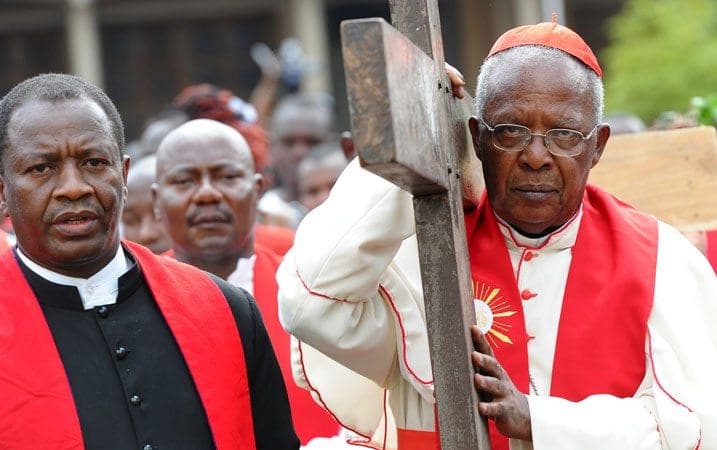ROME — As a young man, Cardinal John Njue of Nairobi, Kenya, became adept at both boxing and karate. He says those skills in the martial arts are “still very useful for me,” especially “when I am provoked.”
Njue, 71, is taking part in the Oct. 4-25 Synod of Bishops on the family, and while he’s not throwing any literal punches, he’s brought the same fighting spirit to this gathering of 270 bishops from around the world.
Here, for example, is Njue’s take on calls at the synod for a more compassionate approach to gays and lesbians.
“It is there in the Bible,” he says, referring to the Church’s teaching against homosexuality. “It is clear.”
“I think there is not much option,” Njue said. “There are facts, such as the fact that God created humanity as Adam and Eve. Whenever someone starts running away from their identity, whatever they do will certainly not be the right thing.”
“If we come to the point of saying that can be changed, there is no logic behind it, with all due respect,” he said.
Njue spoke to Crux on Friday during a break in the synod action.
Even while rejecting the idea of criminalizing homosexuality, Njue still insisted on the right of the Church to flag gay relationships as flawed.
“Where there is a mistake, a way must be found to help people who have made the mistake to understand that they have done something wrong and need to turn around,” he said.
Same-sex relationships are illegal in 38 of Africa’s 53 nations and punishable by death in four. In 2014, Uganda made it punishable by life in prison and declared the “promotion” of homosexuality a crime.
Africa’s Catholic bishops have sometimes been accused of either ambivalence or silence with regard to such measures, but Njue rejected those charges.
“It’s not a question of criminalizing or condemning, but we have every right to help the person understand that the way you are living is not how you’re supposed to be,” Njue said.
One of the most fascinating bits of subtext to the last Synod of Bishops on the family in October 2014 was the emergence of the African bishops as protagonists, in general holding the line in defense of traditional Catholic teaching.
While it’s a different group in Rome this time, and there are clear differences among them on some points, Njue is indicative that several Africans still remain a potent counterbalance to some of the progressive forces at the 2015 synod.
For instance, he’s not sold on the idea of allowing controversial matters such as giving Communion to divorced and civilly remarried Catholics to be decided at the local level, rather than imposing a universal decision from Rome.
“We are talking of the only, holy, Catholic, and apostolic Church,” Njue said. “If we start operating one way in Africa and another way in Europe and so on, then the image of the Church is distorted.”
“The family is at the basis of society, and it’s also at the basis of the Church, so if there is a unified understanding of what the family is all about, then I think we have nothing to lose,” he said. “If there is any form of diversion, it can be very dangerous for the future.”
Njue urged his brother bishops to remain “firm and united.”
He also echoed Pope Francis’ complaints about “ideological colonization,” meaning efforts by Western governments and NGOs to tie development assistance for poor nations to the adoption of family planning initiatives or permissive laws on sexuality.
“Let us not swallow things just because they have come to us,” Njue said, saying African nations must ask, “Are they truly safe and positive, or are they meant as a subversion?”
He said Kenya is currently a case in point for the effects of ideological colonization.
“They are trying to introduce family planning in the primary schools in Kenya,” he said. “You can be sure it is not something that is originating from Kenya, but is being pushed from outside, which is a pity.”
Njue also bristled at suggestions, recently voiced by former Irish President Mary McAleese among many others, that a group of celibate males doesn’t have any business discussing family life.
“I didn’t come from upstairs,” he said, “I was born in a family!”
Njue told a story to illustrate that he’s no naïf when it comes to the pain families can experience. When he was just three or four, he said, he watched his father beat his mother. When he asked his mother later why it happened, she told him to go to his father and ask.
“I stayed a good distance away, but I asked him why he had beaten my mother,” Njue said. “I could hear his roar start, and by the time it finished I was a mile away.”
Yet from that point forward, Njue said, his father was a “different man,” no longer violent with his mother.
Given that background, and his strong convictions, it’s clear that Njue doesn’t intend just to sit on the sidelines of this synod, but wants to be in the thick of the action.
“We know that our understanding of the family is in danger as we speak, because there are so many ideologies that come in, [such as] individualism and secularism,” he said.
“This is why I feel this synod comes at the right time, so the Church can come up with a way of strengthening the identity of marriage and the family.”
















